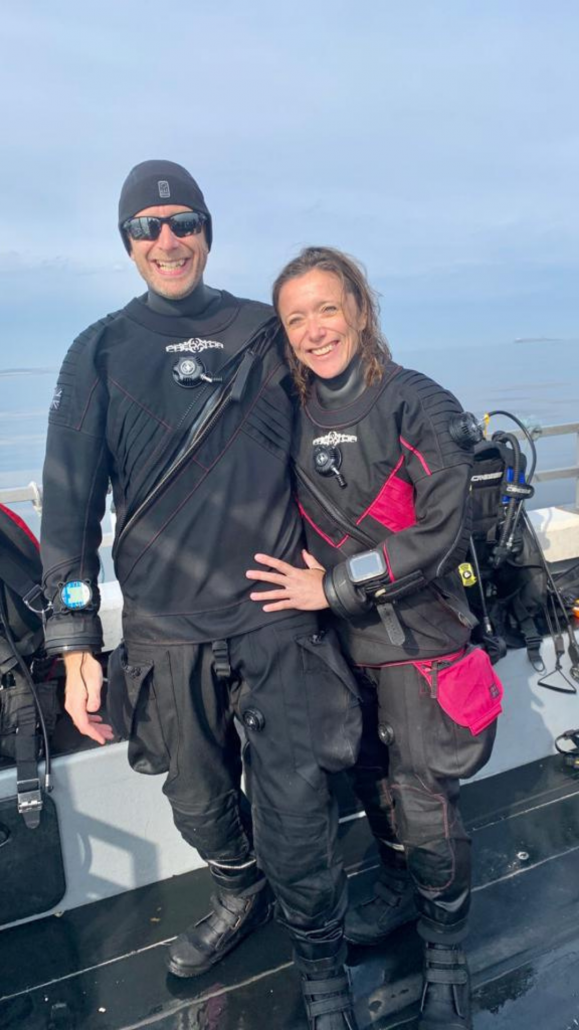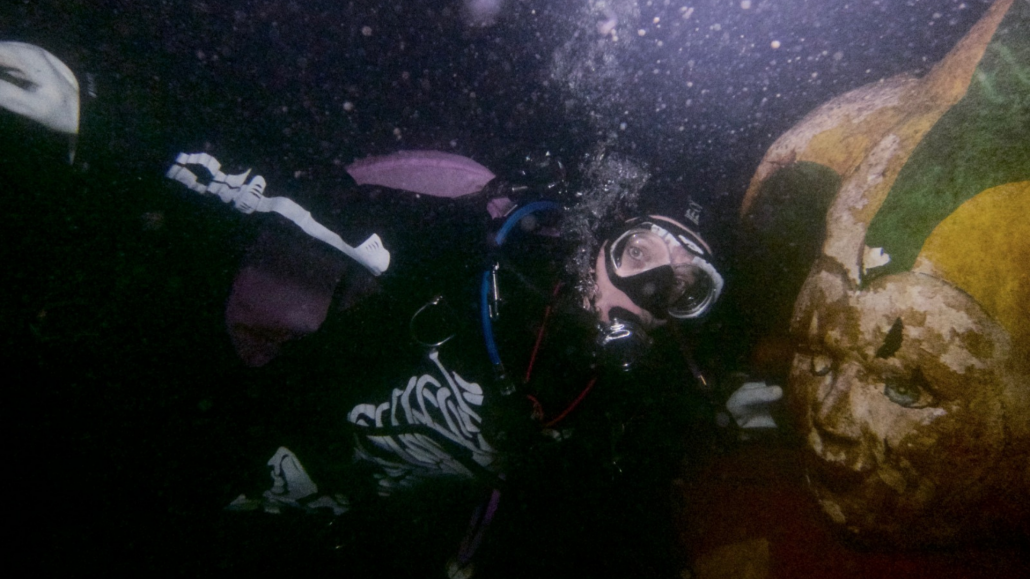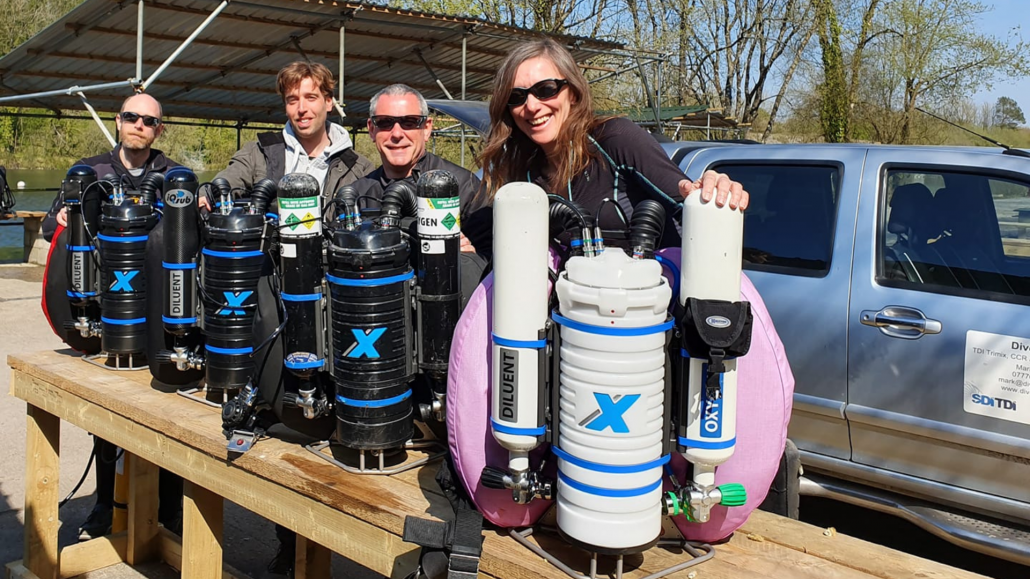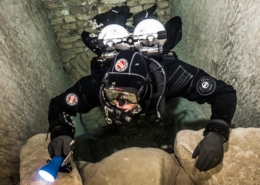A Diving Story: A love story. A life story.
By Emma Lloyd
An isolated slope in the Himalayan foothills. 1990. I’ve become separated from my friend. A young man approaches and at first, I think he is going to lead me to my friend, but it soon becomes obvious from the kissing noises he is making that this is not the case. An attempt at offering jewelry and money goes nowhere. A struggle. Futile shouting for help. Eventually, I’m on the ground and his hand is clamped tightly over my mouth and nose. I can’t breathe. Just before I black out, he takes his hand off my face. The struggle is over…

I survived that day in the Himalayas, even though I thought my time was up at the age of 22. Following the incident, there was a very brief, humiliating police investigation. A female police officer asked me, smiling, if I had enjoyed it. Later, at the British High Commission in Delhi, a kind Sikh advised me to go home and put it behind me, and that’s largely what I did.
Life happened.
I did all the usual things – went on holidays, spent time with friends and family, went shopping, watched movies, studied and worked. There were happy times and achievements: two degrees including a Masters from Oxford (and that from a former school dropout). A professional career. A marriage that worked for several decades. A beloved daughter. And there were heartaches and failures: a seven-year struggle with infertility. Six pregnancy losses. Eventually, the end of my marriage — my own doing.
Craving adventure
Suddenly I was 51 and moving into my own place. High on my newfound freedom, I craved adventure like a drug. I’d never lost my love of travelling, despite my early experience. I’d climbed mountains, hiked, kayaked, gone on safari, and swam in tropical waters. In many respects, I was bold. And yet, something remained from that day in 1990. It made its presence known, manifesting in a fear of being trapped and unable to breathe. I always requested an aisle seat in the theatre, fearing being trapped in the middle of a row; I was uncomfortable and panicky on packed tube trains. I never let these neuroses beat me, silently overcoming them by willpower, never making a fuss about it. I didn’t want to be pathetic. I became a lifelong runner, always solo, savouring the freedom and lightness of running — the ability to turn a corner at random, any time I chose, completely in control of my body and destination.
Scuba Diving Fears
What terrified me more than anything else was the idea of scuba diving – the concept of being, as I saw it, trapped and weighed down by heavy equipment, relying on it for your life’s breath, dropping down into the unknown. It was the utmost horror to me. What’s more, it was a buddy sport, so divers were reliant not only on machinery, but also on other humans – the antithesis of the lightness and solace that I got from running. I hated the idea of being reliant on other people — I was supremely self-reliant — I’d survived no thanks to other people. I certainly didn’t want to be relying on anyone for my life. Happily snorkeling in the sun-dappled waters around Sydney, where I lived for seven years, I would look at the scuba divers setting off in their dive boats and feel so happy and relieved that it wasn’t me.
Enter a Tech Diving Beau
Love struck. I met someone who shared my desire for freedom and adventure. We would talk for hours about our love of long-distance train journeys, smoky megacities and crystal clear seas. We dreamt about kayaking in the fjords in Norway and hiking in the Rockies. We talked about sailing away. But there was one thing that I knew but tried not to think about too much. He was a passionate, almost obsessive diver. And not just a diver, but a technical diver, the hardcore kind.
Would I learn to dive?
Months passed and eventually the question came that I knew was inevitable: would I like to learn to dive? A perfectly reasonable question, as he knew I was bold and adventurous and I’d taken an interest in his diving. However, my stomach lurched on hearing it. I didn’t want to tell him about my terror of diving, partly because it seemed pathetic to me and that’s not how I saw myself, but also because I immediately started talking myself into the benefits and positives of doing it. Surely, in my newfound confident and independent state I was capable of this? Surely, I could manage the Open Water qualification — even children can do it! Surely, it would be amazing to actually be able to do this. I loved snorkeling and this would be way better….
I signed up for an Open Water course. I tried to feel enthusiastic about it and imagined all the fun times Ben and I would have diving on coral reefs, but as the course approached I started to feel a sense of dread. I couldn’t rationalize myself out of it. It came from too deep within. It was too primal. I breezed through the theory day with my course companions, including a bright 11-year-old boy with his dad, and a friendly 16 year old girl.
Confined Water Caution
The next day was a skills session in a nearby swimming pool. My heart was already beating fast as I squeezed myself into a drysuit. The constriction around my body, especially my neck, set off small sparks of fight or flight impulse before I’d even entered the pool. Everyone else seemed so comfortable with it all — deflating their wings like pros and sinking down to the bottom of the pool with ease. But I stayed on the surface, struggling with myself, desperately fighting my dread of going under the water. It soon became obvious to the instructors that I was something of a special case, and I was assigned an assistant instructor to myself. Over the course of the day, I somehow managed to quell the panic enough to get to the bottom of the dive pit in the pool (all 3 metres of it!) and perform some basic skills. By the end of it, I was exhausted, but I got through it.
Open Water Anxiety
The next weekend was more serious — two days of training in a local quarry. Given that the pool had been a struggle, I spent the whole week wondering how I would manage it. Being able to successfully complete this course, suitable for children over 10, seemed as unlikely as flying to the moon. However, I was the product of a 1970s childhood, and I had been taught that whatever happens, you show up. Feeling sick, I got kitted up on the pontoon, everything feeling like a weight or a constriction — drysuit, mask, hood, fins and tank — all of it pinning me to the spot. I might as well have been in a straitjacket, as far as I was concerned. No possibility of flight — only the constant fight going on in my own head. I stared bleakly into the cold, grey water.
Mustering every bit of my inner strength to conquer my fear, I jumped in. Clinging frantically to the shotline, my assigned instructor hovering by my side, I made it a few metres down before clawing my way back to the surface — heart pounding, mouth dry, breath ragged. This happened several times. The instructor started to look concerned, but I insisted on trying again. With a Herculean mental effort, I made it down to about 12 metres, and I took the instructor’s hand and allowed myself to be led around on a little circuit around some sunken vehicles. Inanimate objects that had been innocently placed to provide useful training for divers seemed horrific to me in my panicked state. Not only was the water grey and murky, but the planes and cars seemed grotesque and terrifying lying in the silt. My primal brain wondered what else, if an aeroplane was down here, could be lurking in the darkness? My mouth was impossibly dry and my heart was pounding. I couldn’t take it anymore, and I motioned to ascend. I flunked the course.
A mixed bag of failure.
There was an immediate sense of relief as I drove away from the quarry, but later on, I felt a mixture of emotions. Mostly, a sense of shame and frustration. An 11-year-old boy was merrily breezing his way through it, for god’s sake. I was someone who took pride in their strength. Not that long before, I’d skipped up a mountain in Uganda, astounding my guide who was used to overweight Westerners spending two days struggling to a camp that I reached in a few hours. I’d run marathons and was a triathlete. I stuck it out though a professional career. I’d given birth. And yet here I was, unable to achieve something so basic. A bit of anger crept in. How had I allowed myself to end up in this position? Why the hell hadn’t I just said that I didn’t want to dive?
That „grow together“ type of love.
I had to break the news to Ben. However, love was still young at that point, and it wasn’t until later, on a warm and heady night in Egypt, that I opened up to him fully. He was completely understanding, and desperately sorry that the whole thing had been such an ordeal for me. But there was something about it too that he rightly didn’t understand — he knew me as fearless, his “tigress”. It was inexplicable.
A few weeks later, the two of us were in my little kitchen on a Saturday night, cooking a stir fry and drinking G&Ts. I put my hands on his chest and asked if the relationship would be OK if I never learned to dive. There was no hesitation…it was a crazy question. He would just dive less. The subject was dropped, and I had every intention of putting the whole embarrassing episode behind me and concentrating on things that I was actually good at. Yet over the next couple of months, diving kept coming back into my mind. I wasn’t willing to be beaten by something.
Adventure is calling
However, it wasn’t just that. I’d seen Ben’s videos and photos of amazing underwater experiences — diving with hammerheads in Malpelo. Diving the Arch near Dahab. He had once told me that he wanted us to dive with manta rays together, and I became determined to make it happen. Even though I was certain I would never be a tech diver like Ben, surely, I could eventually get the Open Water certification? I came up with an idea. Maybe if we went somewhere where the water was warm and clear, where there were pretty fish to look at, it might be easier for me? We booked a trip to the diving mecca of Dahab, Egypt, known to be one of the easiest places to learn to dive in the world.
Dahab bliss
Everything was right from the very beginning. It was our first trip abroad together and we were full of delight over everything. The bland hotel room that we stayed in pre-flight near Stansted Airport felt like a honeymoon suite. The restaurant that we ate in during our four hour stopover in Istanbul airport felt like the Ritz. I fell in love with Dahab instantly – its laid-back vibe, blue skies, lazy well-fed stray dogs and sparkling waters. Rows of open-fronted dive shops on the promenade sitting side by side with restaurants wafting mesmerizing Egyptian music. Chalk boards offering yoga. It instantly felt benign to me.
Open Water Diver Part 2
We arrived at the dive centre for my first session. Incredibly, I only felt moderate nervousness, not the complete panic that I’d felt back in the UK. I struck lucky with my instructor, Johannes. A quiet, calm, unassuming young Dutch guy, he seemed to intuit me from the start without knowing any of my backstory. He assured me that we would go at my own pace, and his calm demeanour instantly soothed me. We walked out of the dive centre and waded into the warm waters of Bannerfish Bay.
Over the course of the next few days, I made significant progress. Kneeling in water only around 6 metres deep, just off the beach, I managed to do most of the skills required for the Open Water certification. Tasks that involved taking my regulator out of my mouth or flooding my mask were particularly challenging and made my heart pound, but, keeping my eyes constantly on the reassuring image of Johannes in front of me, I avoided panic. As well as working our way through the skills, we would drop down together through the clear, sun-streaked water to the sandy seabed at around 12 metres, doing tentative circuits around the reefs.
Feeling delightful
At first, I could only keep my eyes fixed straight ahead, or on Johannes. My brain was too busy focusing on staying calm to develop awareness of anything else. But on the third day, I looked to my left, and I became aware of a trumpet fish swimming nonchalantly alongside me. I felt an enormous surge of delight at its elegance and serenity, and instant affection for its delicate, whimsical face. It was the first time that I could see beyond my nervousness to the unfathomable beauty and majesty that now, just possibly, lay within my reach.
Several blissful days passed in this way, with Johannes during the day while Ben solo dived, then a cocktail in one of the bars along the front as the glints of sun on the water of the bay were replaced by those from Dahab’s twinkling lights. Eating date ice cream, walking hand in hand down the promenade. I had almost completed my open water training. I was on the cusp of a miracle.
Curve Ball
On my fourth day, a curve ball hit me. Johannes was off sick. I arrived at the dive centre to find that his replacement was someone of a less reassuring demeanour. In fact, he was decidedly gung ho. He couldn’t understand why open water training was challenging for me, why it was like running a marathon — surely it wasn’t much harder than walking across the room? After one dive with him I was sobbing into Ben’s lap on the roof garden of the dive centre. But I agreed to try again that afternoon. I managed to descend, but was in such a bad emotional state that I rocketed almost immediately to the surface. This had been my last day of training – I had flunked again.
Another fail but determined to pass
Ben came back from his dive to find me lying in the hammock at the back of the dive centre. I could see his concerned and crestfallen face, having heard the news about my second flunking from the dive centre people. He was sure that it was all over — I would never get back in the water again. But he didn’t know that I’d seen a trumpet fish. I was not giving up.
That night, sitting outside an Indonesian restaurant, over nasi goreng and beer, I told him everything there was to know. A lifetime of self-reliance and inner resourcefulness, finding my own solutions to tough stuff, meant that it did not come easily for me to open up fully. I wasn’t used to showing vulnerability. But my struggle with diving was slowly forcing open that which lay deep within me, like fissures in the seabed. Painful, but liberating. We talked for hours. We learned about each other. Our love grew even stronger.
Back in the BCD and getting comfortable
Back in the UK, buoyed up by the progress I’d made in Dahab, I started going on regular dives with Ben at a nearby inland diving centre. After the ease of diving in a wetsuit in Dahab, I had to get used to getting kitted up in the cold-water gear again, but I was determined to make it work.
We took baby steps. The first time we went, it took me at least five minutes to get down the shotline to the 6-metre platform. Next time, I made it to a sunken car at 10 metres, took one look at it, and immediately turned back, freaked out. We took it slowly, going a tiny bit further each time. Gradually, the underwater environment became familiar and less foreboding. I became happy there. Within a short time, my confidence had soared, and something had clicked inside me. I thought nothing of swimming through the submerged plane at 15 metres. There was nothing to be afraid of under the water. Whatever you encountered, it was likely to be something interesting or appealing. And diving became therapeutic for me — the silence, the serenity — my mind felt cleansed of its random and mundane thoughts as I drifted through the water.
Scuba diving regulars and Certifications
We became regulars at the lake that spring and summer, walking hand in hand around the place, chatting with staff and fellow divers. We would kiss underwater with our regulators. They were slow, tranquil days. In the summer, I did some sessions with Ben’s longstanding instructor Mark, and finally, almost a year after that first session in the swimming pool, I passed my Open Water certification. I had achieved the impossible. It was an emotional day. Despite having obtained two degrees and qualifying as an accountant, passing Open Water felt like the hardest thing I had ever done in my life. I was immensely proud.
But what I had thought would be the most I could ever hope for in diving turned out not to be. I had made so much progress that within another month I qualified for Advanced Open Water. It seemed unreal. A year ago, I was terrified to look underwater in three metres of water in a swimming pool, and here I was, happily diving to 30 metres! I was in a space rocket, except it was pointing downwards, a drysuit in place of an astronaut suit.
Then followed an enchanted summer of diving off the coast of the UK. My first sighting of a cuttlefish in the clear water off Chesil Cove. Long, languid dives under Swanage Pier, smiling at pugnacious crabs and marveling at shy, elegant lobster. My first tiny taste of wreck diving — the Valentine Tanks in Poole Bay, full of Conger Eels with their comical and endearing gaping mouths. Afterwards, fish and chips with our legs dangling over the harbour wall. Cosy nights curled up on a mattress in the back of the car, waking to the sound of crashing waves and talking philosophy over a thermos of warm coffee.
Scuba bliss – a sealife tour
In the autumn, a trip to Northumberland brought further delights. We took a boat and dived with seals in the Farne Islands. I was enraptured. The environment was like the most beautiful underwater garden. How could I ever have imagined this to be frightening? Steep walls adorned with tumbling, lush greenery and full of life, not dissimilar to the mountains and valleys that I always loved to hike in, but underwater. We chatted to an interesting fellow diver on the boat who we later learned was an expert on seals and had spent years diving with them. And even though he had jumped into the water way before all the other divers, disappearing beneath the waves, when Ben and I jumped in he suddenly appeared next to us, and treated us to a journey around all the secret places where the seals go. He was incredibly fast, darting around like a seal himself, and we had to fin rapidly to keep up with him. I felt unbelievably privileged.
Wreck diving
And then my first proper wreck – The Somali, off the Northumberland coast. I felt no fear at all as I left the shotline and drifted over the wreck. Not only was it teeming with life — shoals of shimmering fish meandering around the hull, crabs and lobsters sheltering in the nooks and crannies — but the shapes thrown up by the wreckage were majestic and dramatic against the haze of the water.
I had the same kind of sensation that I’d had on holidays in far off places, wandering around some crumbling ancient ruins or gardens – the serenity and beauty of something manmade being claimed by the natural world – how humans tend to bulldoze their way around the planet, but how gently, in contrast, nature takes over a piece of discarded human history…making use of what is there, the greenery and barnacles enhancing and softening the stark metal. And always, with diving, the silence. The amiable and peaceful meandering of divers, without the chatter of human voices.
An emerging tech diver
By the end of that year, I was diving in twin tanks and a stage. And the following spring, only fifteen months after I took those first underwater breaths in Egypt, I was diving on a rebreather, a giant stride into tech diving. It seemed like an alien world to me at first, during that freezing and damp April — full of men in black and impossibly heavy and technical kit. But my determination never to give up was still there, and with patient tuition, just as spring turned into a warm summer, I qualified as a rebreather diver. The moon was long behind me. I’d landed on Mars.
I know that boundless adventure waits for me under the waves now — the reefs and wrecks and myriad of enchanting sea creatures spread throughout our planet. Maybe even The Galapagos, the Ceynotes in Mexico, Truk Lagoon, ice diving or cavern diving. I’m grateful to Ben for giving me the gift of diving, and I’m grateful to myself for having the guts to face my deepest fears. Looking into them has been the hardest thing that I’ve ever done in my life or will ever do again. But I will never look back. Maybe I’ll just look to my left, because I know that wherever I am, whether it’s a cold quarry in the UK, warm tropical waters or a deep wreck somewhere, that trumpet fish will always be there, guiding me on.


















Zanechat odpověď
Chcete se zapojit do diskuse?Neváhejte přispět!